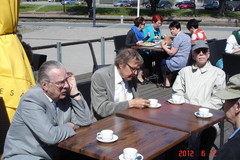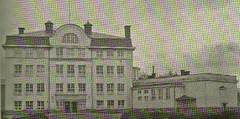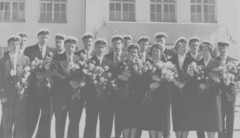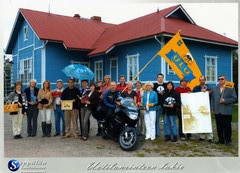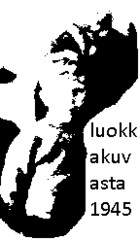BRAUDEL, LA LONGUE DUREÉ, CONJUNCTURES, EPOCHS, SOCIAL SYSTEMS and INSTITUTIONS, PROGRESSIVE EDUCATION
Ending noteThe Abridged Last Chapter of the Dissertation Fernand Braudel´s concept of historical time consists of three durations (durée). The basis is an unending flow of time with barely noticeable changes (“la long durée”). Change belongs to the second “durée” in which time proceeds in “cycles“ or “epochs”. Change appears as epochal conjunctures and is discernible only if one is able to see past the immediate experience. The third “durée” is the passing of daily unepochal events. In addition to the temporal “durées” Braudel refers to the geographical extension on which to tie the object of research. For instance cultures, national and ethnic mentalities and morales, family moralities, mental attitudes, traditional ways of thinking, social manners of behavior, cognitive structures, symbol systems etc. can be seen as belonging to the “long durée”. The difference between the things of “long durée” and those of an epochal time of conjunctures is sometimes small and often unclear. For instance ideologies, social manners, systems and institutions may in some aspects be near to an unending continuation with little changes and sometimes near to an epoch of conjunctures. An example of the former could be market economy and of the latter the socialism of the eastern bloc during the time of the Soviet Union. The third level of historical time can be defined as a “normal” flow of events, rites, customs, beginnings, endings, institutional happenings etc. and talk and criticism, reports etc of them. If, as a basic dimension of reference, we apply Braudel´s conception of historical time on my research, it proceeds on cyclical level of conjunctures. The epochal reference is the efforts to reform the Finnish upper secondary school, lukio, during the 20th century. Its theme is a description and an interpretation of the processes of searching for the ways and possibilities of reform through committee work and experimenting. Inherent in the work is how the reform energy varied in the cycles of the epoch and how the strength of hidden social dynamics, for example the need for permanence required by social cohesion, sets limits on the extension and rate of change. You can presume that the world into which you are born is experienced as self-evident and permanent. The extent to which change is seen possible and to be hoped for, varies from person to person, from society to society, from epoch to epoch etc. The progress of change is measured generally by parts of centuries, decades and often by generations. The three levels of historical time are simultaneously present. When for example a demand for greater equality of schooling is raised, there follows a more or less intense collision between the principle of equality and the traditional function of distinctive and selective function of schooling. The former belongs to a certain epoch, while the latter is a thing of the long “durée”slowing, if not hindering any possible change. Advancing to-and-fro is typical of the development of cultural institutions, for instance education. An example is the planning and preparing of the reform of the Finnish secondary stage schooling: the directive of the parliament had been to establish a comprehensive secondary stage that should give an equal basis for professional schooling. The committee nominated to work out a detailed plan according to the will of the parliament. However in the end the resolution of the government was to retain general (lukio) and vocational education separate, which meant that the “lukio” would retain its special state and status. The role of formal education does not seem to diminish. This may be due to the fact that school is expected to renew the structure and praxis of society, and as such it is hard to replace and a blanc is unimaginable. This being the case, the secondary education is the proper mill and practically the only means to accomplish the task. Neither does the competitiveness of the competing society seem to diminish. On the contrary, in the whirlpool of business and market the voices that demand equality of education are not so loud any more as they used to be some time ago. Stephen J. Ball, professor in sociology of education in London University, has said that education cannot any more be seen as a national project because of globalization. According to him there is a new kind of political settlement in post-industrial and post-welfare states, in which governing and responsibility of action is being organized anew. Effectiveness and performing capacity are gaining ground and emphasis and sneaking a place among the basic values. There has risen a pressure to make knowledge marketable and education a commodity. Finally the mediating of knowledge can be taken away from schools, and, for instance, chemistry teaching may be bought from a private laboratory. According to Ball the change is actually ethical, when the values of business displace the communal values of good life for all, and vocational ethics is replaced by utilitarianism and marketing. While business-mindedness increases effectiveness, it produces a new kind of moral code. While according to Herbart education is to teach, what do the principles of business mean from this point of view, Ball asks. Could the result be a mentality of production, competition and and seeking for one´s own good accompanied by the esthetics of consumerism ? Referring to Bourdieue Ball claims that education has become a new kind of struggle of social classes, in which the ideology, profits and force of the middle class challenges the official education policy: justice, equality, respect and tolerance, and a society that makes a safe and sound life possible. Also in Finland the virtues of market economy, mentality of competition and action have been gaining foothold in the public sector, schools included. This is concretely the case, when top consultants of the business world are invited to speak to teachers. Then the old-fashioned, unwieldy, inefficient public sector is given a thorough trashing, and all the praise goes to the dynamic principles, effectiveness and high quality of the business world. Transferring decision-making to the local level and loosening of regulation have been necessary to make this possible. Control has become evaluation, in the sign of which the Department of Public Education arranges statewide tests to learn how schools are doing. Not surprisingly, teachers´ and pupils´ fear for them reminds unmistakably of the phobia felt for the undergraduate examination in "lukio", where, notoriously, “statewides” have been arranged for well over a century. How to produce lifelong ability to learn is growing more and more acute. In this respect the challenge to modernize education is huge. The role of public education needs to be discussed, and then the focus must be sharing vs. not sharing knowledge and culture, empowerment vs. selection. Hopefully Braudel´s “long durée” might not be as deterministic as it may sound and Ball´s vision only a fearful possibility and a warning. And there are also signs of enlightenment, and welfare ideology is not dead, though there have been some setbacks. But the advance of the enlightenment project is really slow, and as such a good example of the “long durée”, and of course it would be unrealistic to expect that education could be an exception. So, what in fact is happening in the Finnish “lukio”? If you compare it to what it was before the reforms, the difference is great. However, in the future we may have to realize that while the traditional gymnasium supported the distinction of social classes, and was for its part a selective control of getting into positions. When the competition grows harder, private interests and seeking for one´s own good may collide more fiercely than before. It can be that most life careers pass safely on the middle lane, but the number of those drifting onto the side lane may be more than before. Has the selective function perhaps, under the veil of the poetry of official educational plans, continued? Maybe while selection is more subtle than before, its effects appear on wider stage. The fact that straightforward shutting out is minimal today must not prevent from seeing that the scope of qualification fork has grown, not only denser, but wider to an extent that people on the shadowy side walk in the ditch. If so, the new “lukio” is maybe producing new kind of social layers. This might be due to the fact that when the general educational level has risen fast and already now and probably more in the future the rush to the “euro” positions is becoming harder. Then probably the best merits can be harvested in schooling, and the deciding play-off are fought in the secondary stage education.
KEYWORDS: SEGREGATION, DISTINCTION, DIFFERENTIATING EDUCATION, COMPREHENSIVE EDUCATION, IDEOLOGY, EQUALITY, COMPETITIVENESS, POSTINDUSTRIAL, POSTMODERN, MARKET ECONOMY, WELFARE STATE, WORK, LABOUR, EMPOWERING.
|

